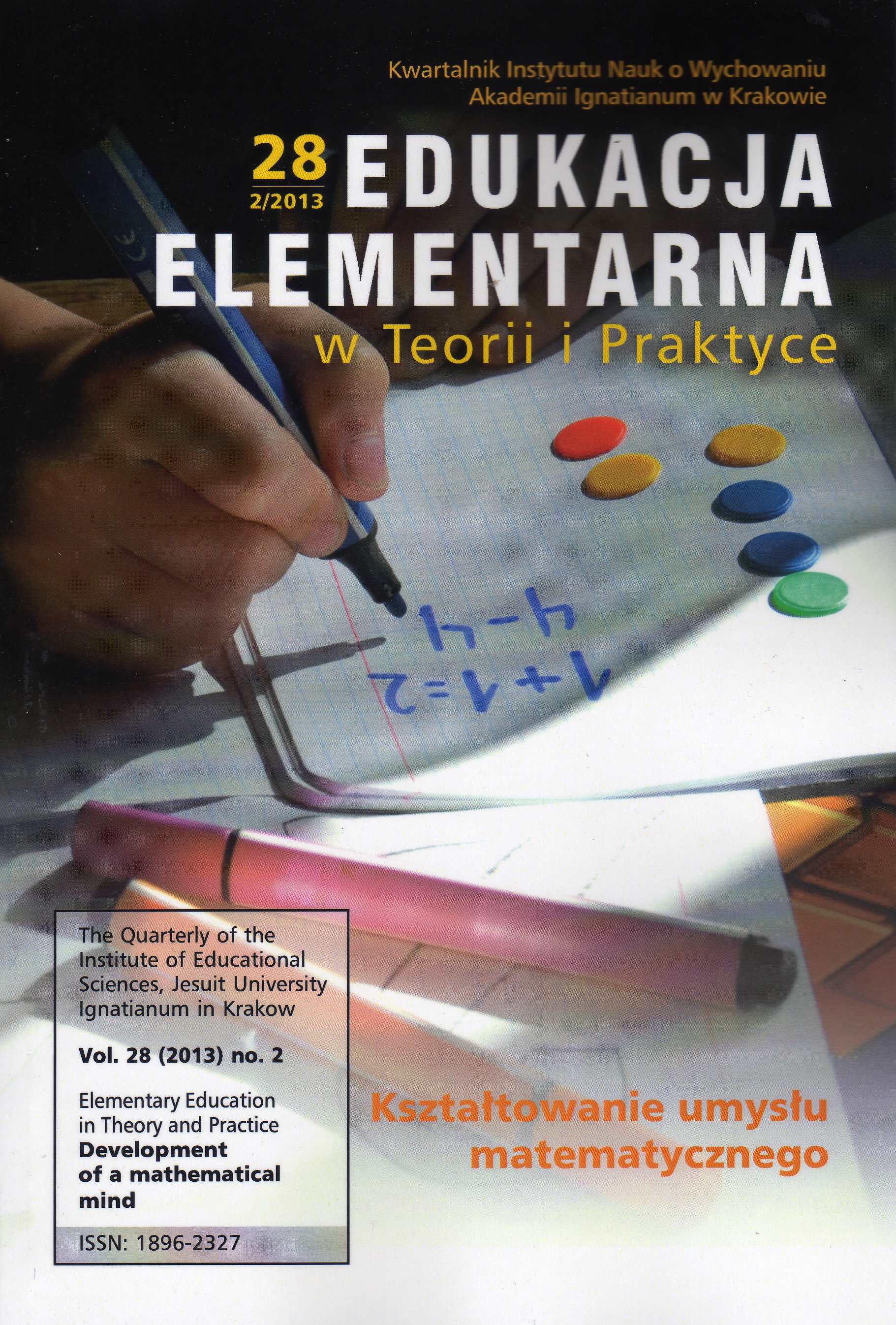Gotowość szkolna do uczenia się matematyki dzieci sześcioletnich w przedszkolu Montessori – raport z badań
Abstrakt
W metodzie Marii Montessori matematyka stanowi ważny obszar edukacyjny, którego celem jest uczenie dziecka samodzielności, rozwijania zainteresowania matematyką, wprowadzanie w świat liczb, odkrywania znaczenia kodowania i działań numerycznych, a także podejmowania celowych działań zmierzających do rozwiązywania zadań matematycznych i odporności emocjonalnej. Wyniki badań mają wskazać, jakie są efekty uczenia się matematyki dzieci w wieku przedszkolnym prowadzonych metodą M. Montessori. W artykule przedstawiono wyniki cząstkowe badań pilotażowych prowadzonych w ramach projektu badań statutowych na temat „Edukacja alternatywna w wychowaniu elementarnym”. Głównym problemem badawczym było pytanie: Jaki poziom gotowości szkolnej osiągnęły dzieci z roczników 2006 i 2007 uczęszczające do Przedszkola Integracyjnego Montessori w Krakowie w roku szkolnym 2012/2013? Dobór placówki był celowy, bowiem jest to jedno z najdłużej funkcjonujących przedszkoli w Polsce w całości oparte na założeniach pedagogicznych M. Montessori. Analiza wyników badań wskazuje, że badane dzieci osiągnęły wysoki poziom gotowości szkolnej w zakresie uczenia się matematyki. Dzieci dobrze radziły sobie z zadaniami wymagającymi wyćwiczenia. W związku z tym można postawić tezę, że teoretyczne i praktyczne założenia nabywania kompetencji matematycznych w wieku od 3 do 6 lat opracowane przez Marię Montessori pozytywnie wpłynęły na osiągnięcie przez badane dzieci gotowości szkolnej. W celu potwierdzenia tej tezy, badaniami należy objąć większą grupę dzieci uczęszczających do przedszkoli montessoriańskich w Polsce oraz porównać je z osiągnięciami przedszkolaków prowadzonych innymi metodami.Bibliografia
Derewlana H., Michalska B., Świątek J., Wosińska B., Karty do diagnozowania gotowości szkolnej, Warszawa 2002.
Gruszczyk-Kolczyńska E., Dzieci ze specyficznymi trudnościami w uczeniu się matematyki. Przyczyny, diagnoza, zajęcia korekcyjno-wyrównawcze, WSiP, Warszawa 1992, s. 20.
Gruszczyk-Kolczyńska E., Zielińska E., Program wspomagania rozwoju, wychowania i edukacji starszych przedszkolaków (czterolatków i pięciolatków), Nowa Era, Warszawa 2009, s. 243-252.
Gurycka A., Zainteresowania, [w:] Encyklopedia psychologii, red. W. Szewczuk, Fundacja Innowacja, Warszawa 1998, s.1076-1082.
Guz S., Edukacja w systemie Montessori, Wydawnictwo UMCS, Lublin 1998.
Guz S., Metoda Montessori w przedszkolu i szkole. Kształcenie i osiągnięcia dzieci, Wydawnictwo UMCS, Lublin 2006.
Montessori M., L’autoeducazione, Garzanti, Rzym 1992.
Montessori M., Psicoaritmetica, Roma 1971, 1994.
Montessori M., Psicogeometria, Edizioni Opera Nazionale Montessori, Rzym 2011.
Reclik R., Kompetencje matematyczne dziecka kończącego edukację przedszkolną a dojrzałość do uczenia się matematyki w warunkach szkolnych, [w:] Edukacja przedszkolna w teorii i praktyce, red. S. Włoch, Wyd. Uniwersytetu Opolskiego, Opole 2006, s. 171-179.
Semadeni Z., Dojrzałość dziecka do uczenia się matematyki w warunkach szkolnych, [w:] Nauczanie początkowe matematyki. Podręcznik dla nauczyciela, t. 1, red. Z. Semadeni, WSiP, Warszawa 1991, s. 270-271.
Sikorska I., Rozwój dziecka w przedszkolu. Stymulujące wartości wybranych systemów edukacyjnych, Wydawnictwo UJ, Kraków 2010.
Surma B., Pedagogika Montessori – podstawy teoretyczne i twórcze inspiracje w praktyce, Palatum, Łódź 2008.
Szmigielska B., Dojrzałość szkolna, [w:] Encyklopedia psychologii, red. W. Szewczuk, Warszawa 1998, s. 64-67.
Tyl A., Rozbudzanie zainteresowania matematyką w edukacji przedszkolnej, [w:] Edukacja przedszkolna w teorii i praktyce, red. S. Włoch, Wyd. Uniwersytetu Opolskiego, Opole 2006, s. 251-261.
Wilgocka-Okoń B., Gotowość szkolna dzieci sześcioletnich, Wydawnictwo Akademickie „Żak”, Warszawa 2003.
Copyright (c) 2013 Edukacja Elementarna w Teorii i Praktyce

Utwór dostępny jest na licencji Creative Commons Uznanie autorstwa – Bez utworów zależnych 4.0 Międzynarodowe.
1. Autor zgłaszając swój artykuł oświadcza, że jest Autorem artykułu (zwanego dalej Utworem) i:
- przysługują mu wyłączne i nieograniczone prawa autorskie do Utworu,
- jest uprawniony/a do rozporządzania prawami autorskimi do Utworu.
Oświadcza, że nie narusza praw autorskich osób trzecich i praw prawnych.
Oświadcza, że nie występuje żaden konflikt interesów.
2. Udziela Uniwersytetowi Ignatianum w Krakowie nieodpłatnej, niewyłącznej, nieograniczonej terytorialnie licencji do korzystania z Utworu na następujących polach eksploatacji:
- utrwalania utworu w formie papierowej, a także na nośniku cyfrowym lub magnetycznym;
- zwielokrotnienia utworu dowolną techniką, bez ograniczenia ilości wydań i liczby egzemplarzy;
- rozpowszechniania utworu i jego zwielokrotnionych egzemplarzy na jakimkolwiek nośniku, w tym wprowadzenia do obrotu, sprzedaży, użyczenia, najmu;
- wprowadzenia utworu do pamięci komputera;
- rozpowszechniania utworu w sieciach informatycznych, w tym w sieci Internet;
- publicznego wykonania, wystawienia, wyświetlenia, odtworzenia oraz nadawania i reemitowania, a także publicznego udostępniania utworu w taki sposób, aby każdy mógł mieć do niego dostęp w miejscu i czasie przez siebie wybranym;
- w zakresie praw zależnych do Utworu, obejmujących w szczególności prawo do dokonania koniecznych zmian w Utworze, wynikających z opracowania redakcyjnego i metodycznego, a także do dokonania tłumaczenia Utworu na języki obce.
Udzielenie licencji następuje z chwilą przekazania Utworu na rzecz Uniwersytetowi Ignatianum w Krakowie. Uniwersytet Ignatianum w Krakowie jest uprawniony do udzielania dalszych sublicencji do Utworu, w zakresie udzielonego prawa. Licencja jest ograniczona czasowo i zostaje udzielona na okres 15 lat, licząc od daty jej udzielenia.
Wyraża się zgodę i zachęca autorów do publikacji ich tekstu w Internecie (np. w repozytorium instytucji lub na jej stronie internetowej) przed lub podczas procesu składania tekstu jako, że może to prowadzić do korzystnych wymian oraz wcześniejszego i większego cytowania opublikowanego tekstu (Patrz The Effect of Open Access). Zalecamy wykorzystanie dowolnego portalu stowarzyszeń badawczych z niżej wymienionych:




